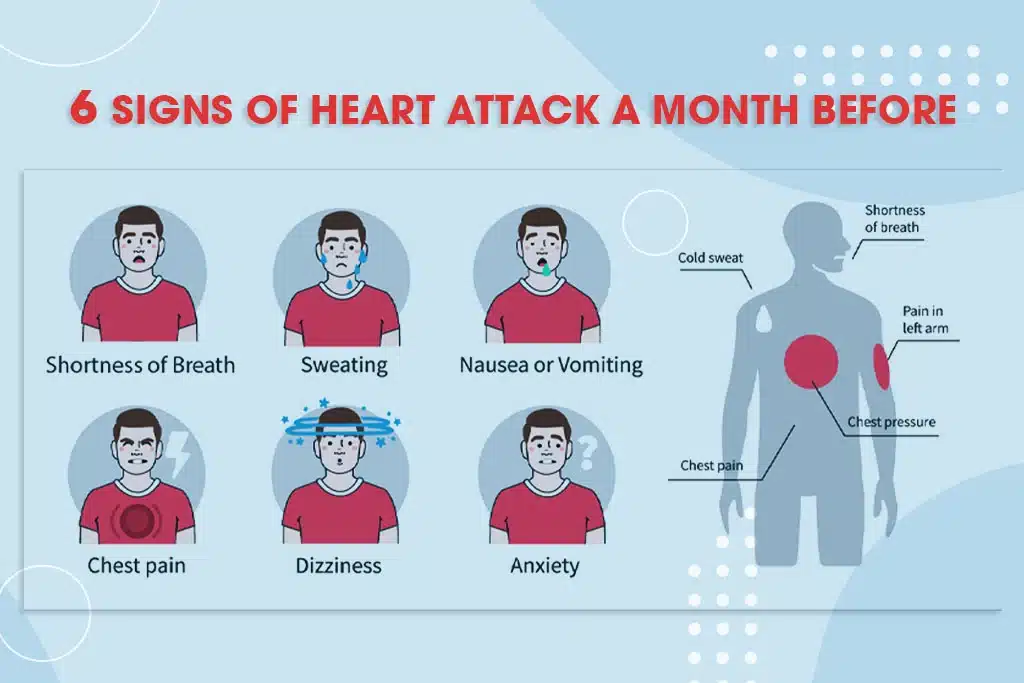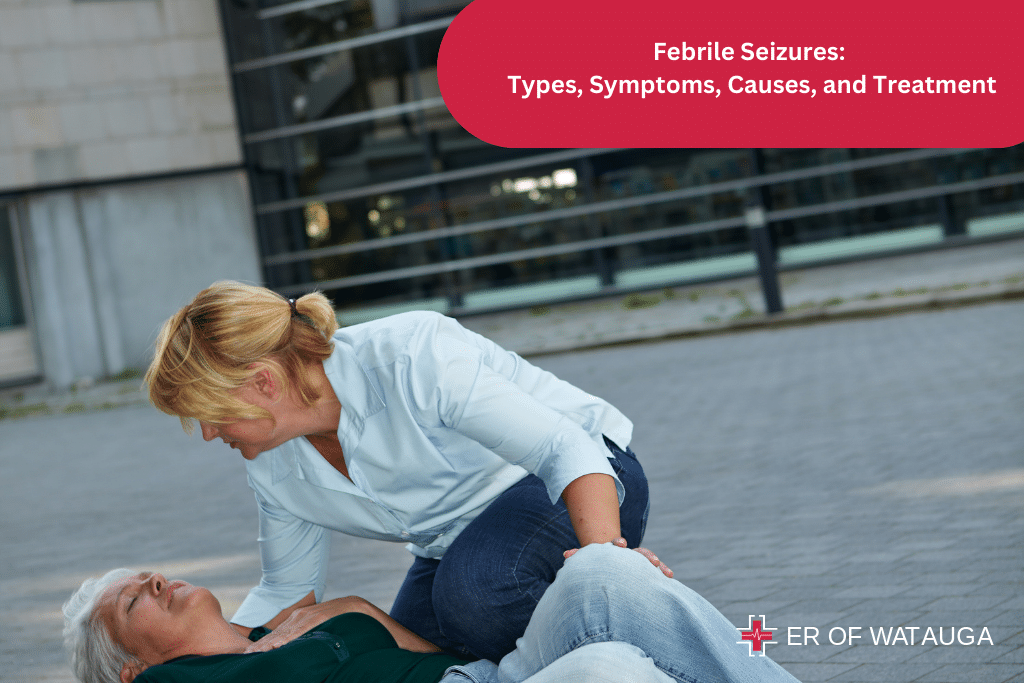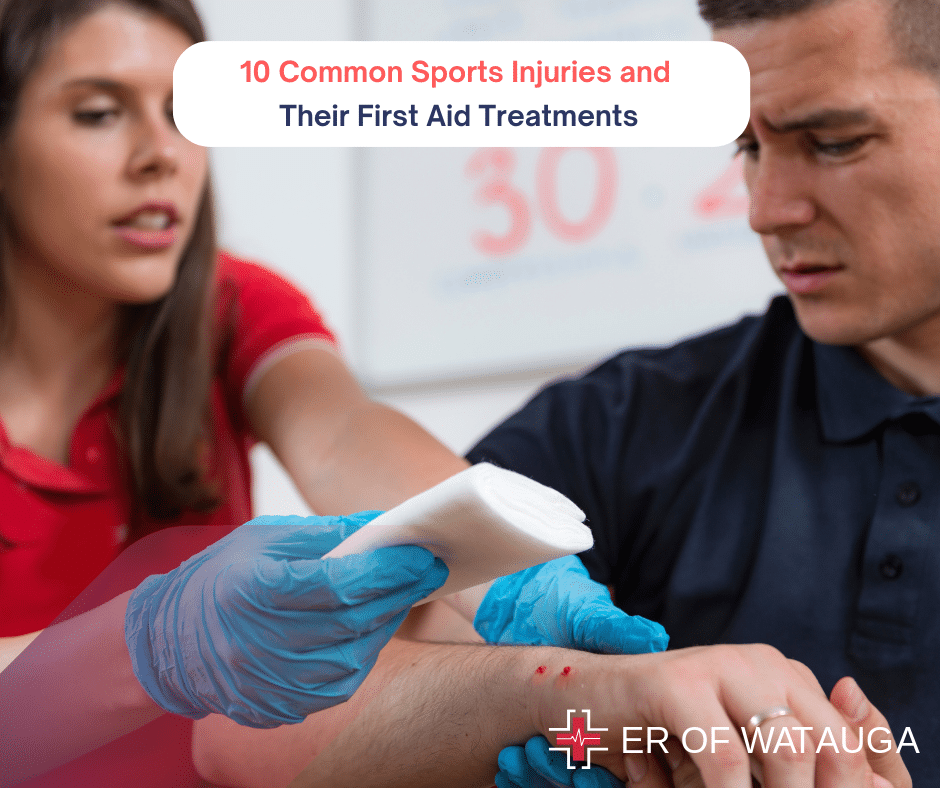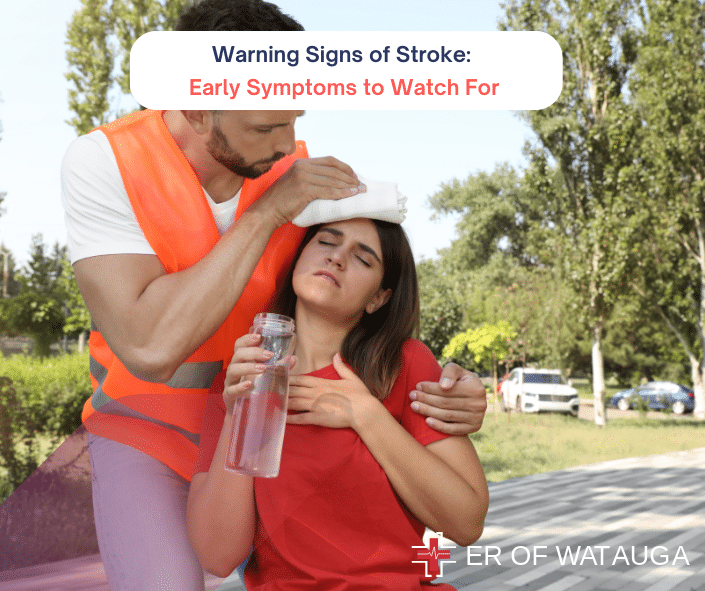Do you have concerns about your cardiac health and seeking a comprehensive guide on becoming aware of the possible signs of a heart attack? Welcome, we have got you covered. A heart attack does not necessitate a diagnosis similar to in movies. Sometimes people may experience a heart attack and not know what hit them. Even though a heart attack may occur either swiftly or gradually, only a few people who suffer from it are aware of the fact that some general signs last for hours, days, or weeks. Whether you or someone you know may be the one who discovers these signs and symptoms, you can be the one who comes to their rescue and saves them.
More and more surveys reveal that men, as well as women, have heart problems. The most frequent cause of death is heart disease. But most people neglect it in most situations. Conversely, a stroke can happen unprovoked or without any warning, at any place and at any time. ER of Watauga is your go-to urgent care facility for providing the best treatment plans, state-of-the-art diagnostic tests, and individualized care for heart attacks. This article will highlight the most distinguishing features of a heart attack so you can understand when to act quickly and seek medical help. Another skill we will talk about briefly will be how to handle situations. Another good way is to read the guidelines twice more.
Understanding Heart Attack
A heart attack is a lethal condition of damage caused by a heart reduction in its size and functionality. There are various causes behind this, like obesity, smoking, elevated blood pressure, inadequate workout, and an increased waist-hip ratio. Supplying the heart with blood then becomes hindered when arteries feeding the heart get clogged, which would lead to a heart attack. It could result in a blockage of an artery passing oxygen-enriched blood to the heart muscle. If breathing difficulty and angina are present, the blockage is likely severe, and the body’s ability to circulate blood to various places has been affected. Extremes would even see the attack threatening to lead to death.
What Signs Could You Experience in the Month Before a Heart Attack?
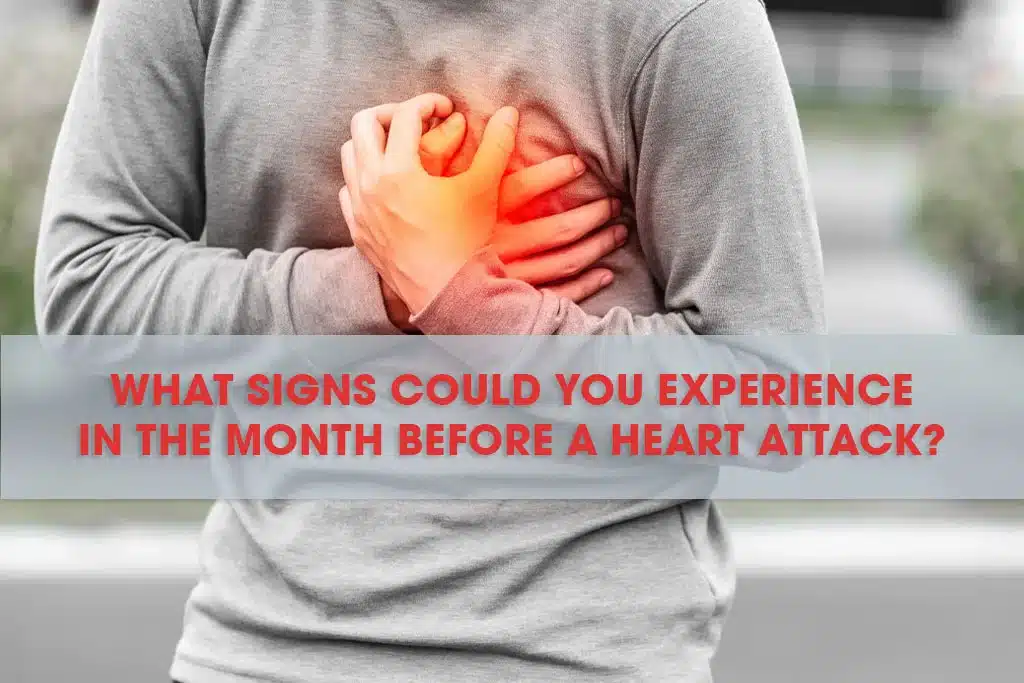
Following are the expected symptoms you may experience a month before a heart attack:
Shortness of Breath
Considering the cardiac veterinary context of dyspnea or shortness of breath, one should not overlook this alarming and severe sign. Shortness of breath is one of the primary signs of a heart attack. This symptom also might surprise physically active individuals who do not have any hard workouts. Household routines that in the past were just done without thinking, things like walking around the house or up a small flight of stairs, might now cause this individual to struggle for air or feel exhausted. Anemia can induce shortness of breath even in the bed rest state, indicating that an active blood pumping mechanism is non-existent.
This develops as a result of heart disease which commonly arises from the heart muscles dropping off its ability to normalize the pumping of enriched blood that contains oxygen to the whole body because of insufficient blood flow to the heart. However, this effect is due to a starved state of the lungs, unable to supply oxygen to the lungs and hence not being able to take a full breath. However, in addition to shortness of breath, palpitations, chest pain, and fatigue may also be baselines. These signs and symptoms manifest in chest pain. This should raise the alarm bells for cardiac problems like heart attack.
Abdominal Pain or Discomfort
Mediocre abdominal pain and discomfort can exist along with other signals of heart disease sometimes, which could be an incidental yet useful marker for cardiac diseases As they are usually mistaken to be a sign of heart-related health issues, such pain experiences a widespread misdiagnosis of other organ diseases. However, in some cases, particularly, during a heart attack the discomfort or pain first starts from the chest and slowly moves towards the abdomen, and it reaches a stage where the person feels either fullness, indigestion, or a gnawing feeling in the abdomen.
The abdominal pain of this variety is not entirely the same as the intestinal discomfort and even regular stomach ache; it is a recommendation for heart disease. Such pain would be like a tightness, a pain that would not ease even after having a complete meal or when you would change positions. The pain can be moderate to severe, and the nausea or a feeling of disturbed stomach can be added to the experience. At times, one may for sure very clearly sense a heavy feeling in the abdomen and this can be the equivalent of a stomach full of food, but there is no logical explanation for this phenomenon.
Chest Discomfort or Pain

Frequent, trembling, and acute discomfort of the chest are described as labored breathing or as angina – a warning sign not to ignore. Angina is a sign that the person may soon suffer a heart attack when they are given a chance for blood to flow for a short period to the heart. This feeling can puzzle very much, as every individual is specific about it. It can seem like a heavy burden has been put on their chest by others. Indeed, for some, it may appear like a heartburn or indigestion. This is important because these sensations look alike at rest after one had an emotional experience, or even after a tedious work.
It is of absolute importance to be clear-headed about the attributes of this chest pain. War tones about the length of meteoroid impacts may continue for several minutes or rather, and the strength of this may vary. Besides the arms or shoulders, the neck, jaw, or back might undergo radiation pain. The feeling of nausea, having jaw or back pain might be unpleasant things that might come into a sensation in varying degrees with women much more likely to complain of nausea as a symptom of heart attack than men.
Insomnia or Sleep Disturbances
Sometimes irregular sleep or insomnia may be mild but facts of hidden ailments leading to heart attack. During normal conditions, people have occasional sleep disturbances, while more severe sleep disorders or persistent difficulties with falling or staying asleep tend to harm cardiovascular health. Besides the issue of falling asleep, waking up throughout the night and feeling tired even while trying to sleep all through the nighttime are the disruption examples. This sign expected for heart attack is very discreet in a way that it is very light. It might not be recognized or mistaken for something else; like stress or age.
Heart problems and sleep disorders have various reasons that play a role in these kinds of illnesses. To illustrate, the disease has, for instance, a close link with sleep apnea which is characterized by repeated breathing trauma during sleep. Apart from that, hypertension, arrhythmias, stroke, and heart failure are heightened risks besides the fact that oxygen deprivation leads to heart weariness but also serves as a trigger for new chronic diseases and preceding complications flare-up.
Anxiety or Unexplained Nervousness
A rare latent side course but a life-threatening one to anticipate before experiencing a heart attack is the emergence of anxiety or intermittent anxiousness which could portray the symptoms as an impending doom. This emotional symptom is usually not taken seriously or added as an additional psychological syndrome, though it may arise directly from the heart condition. The symptoms of a heart attack are not always immediate and discernable, such as shortness of breath or chest discomfort. Panic, unexplainable worry, or a sense of grief quickly develops without predictability or a reason to explain it.
It is believed that the pre-swooning process is connected to the body’s complex reaction to the physiological changes in the heart happening under the skin. The physical signs of stress such as blood and oxygen stoppage to the heart are the signs of the situation. Even if the heart attack has not developed completely in the heart, this particular reaction can be noted. The individual may experience an unusual acute rise in adrenaline and other hormones. These hormones may create in the person a treasure of anticipation, uneasiness, and an off-the-cuff in-mind trouble.
Fatigue or Unusual Tiredness
The link between tiredness or something odd with an unyielding source of fatigue or exhaustion is not only that you are hungover or are feeling so tired because of another hard day. Fatigue or unusual tiredness is one of the primary signs that are expected in a month before one gets a heart attack. It is the sort of being out of energy that doesn’t go away after getting some rest and it may be a signal that your heart is not pumping blood as well as it should. Normally, the heart pumps blood around the body and it supplies oxygenated blood to vital organs and muscles. When it does not realize this function efficiently, the heart will not be able to do its work which then leads to a lack of oxygen and nutrition which are required for fighting diseases.
Eventually, even the simplest tasks will seem the most difficult and will make one feel depleted of their energy for the whole day. Such exhaustion arises from the extreme effort that you make subconsciously, thus, you cannot easily establish the connection with any visible physical efforts leading to the heart attack. People get tired to a very high degree just by doing something simple like taking out their groceries, doing ordinary light housework, or even something as relatively simple as getting dressed. It is a long-lasting, insidious tiredness that has no clues as to its reason and you do not even feel a difference when you sleep or rest.
How to Deal with Heart Attack Symptoms
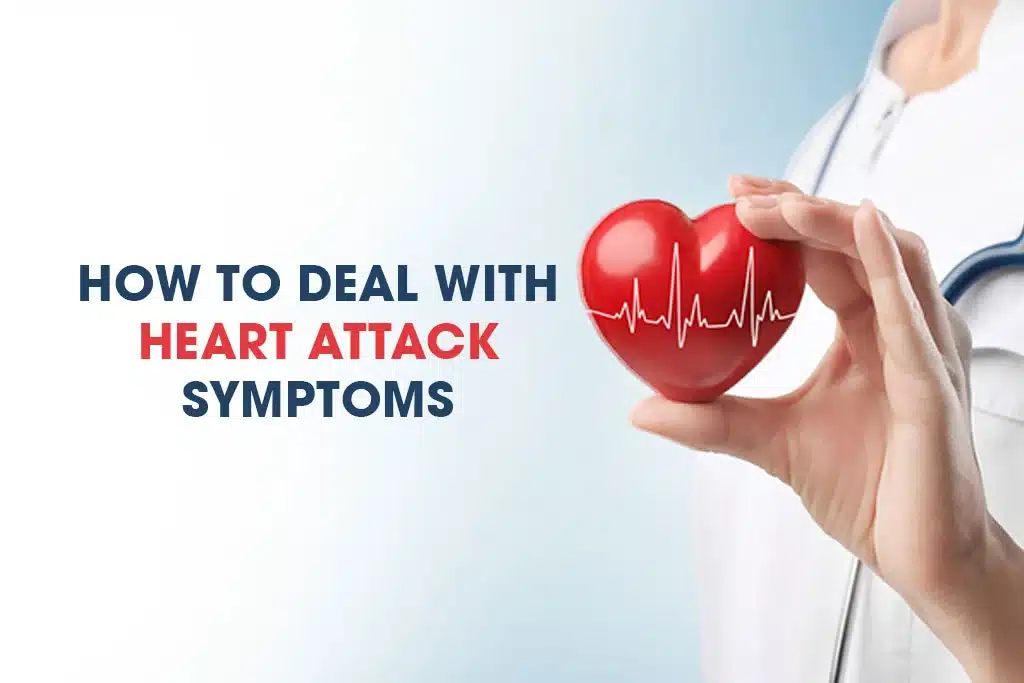
Here, you look through the most frequent heart attack symptoms. We are given these symptoms not for this reason, but rather for the other, to help us prevent serious medical conditions. In the above scenario, however, there are just a few steps that you can take to improve your body health. Let’s investigate how:
Rest: Let me assure you that an excess of these behaviors will tend to cause the appearance of such disorders. Rest is the only device to handle those problems. These symptoms, however, are not necessarily due to heart health and don’t always mean any serious condition. In the case it goes on and doesn’t get any better by the third day you need to see a doctor.
See Your Doctor: The best is to seek help from medical practitioners if you or any of your relatives get these signs and symptoms. This implies we need to go for a consultation with a well-experienced physician if we find ourselves at a high risk of a heart attack.
Give Information: It is necessary to have the necessary documentary evidence ready for the medics once they come. Please bear in mind that you will be asked for your prescription history and the facts of your medical history.
heart attack Prevention: How to Reduce the Chances
These mentioned suggestions may help you reduce the chances of getting a heart attack:
Reduce Your Stress Level
Stress is a major cause of the problems causing heart attacks. Unlike our ancestors who had a very simple life, nowadays stress is the number one factor of being at risk of health problems. In this case, we can exclude the pulse disturbance as well. Consequently, avoiding and reducing stress levels is one strategy that should be employed to prevent heart attacks.
Quit Smoking
Cancer is not the only danger smoking causes to health. The smoking habit is mainly student-led and brings with it quite several challenges. Smoking harms your heart leading to a heart attack. If you have been smoking for quite a while, it is high time to quit this habit. Contact an expert professional to accomplish the first stage.
Maintain a Healthy Lifestyle
We have already emphasized the fact that poor lifestyle habits are the major cause of heart attacks. Hence, it means keeping life to a healthy standard will always have a possibility of reducing the risk. To achieve this, you will need to get a balanced diet, followed by regular meals. To achieve good health, maintain a healthy weight and include some light activity in life.
Regular Checkup
Your age, and the illness that you struggle with, don’t mean a thing if you let yourself do regular medical testing for your well-being. Special testing of the heart will also be necessary since an assault or other serious disease of the heart may be prevented by this process.
Conclusion
To prevent heart attack from apprehending the symptoms it is imperative to know about the expected signs before getting one. Awareness and quick response result in successful treatment. Do not get overwhelmed if you or someone around you is showing these symptoms. First, do not panic and seek medical attention.
We at the ER of Watauga are committed to the sustenance of the good health of our community and are there to offer a wide range of healthcare services to address heart matters. We have a team of experts, who are specialized in heart attack treatment that make use of the most advanced medical interventions. Our main aim is to stabilize patients and initiate the process of recovery. Additionally, we provide tests for enzymes in the cardiac area and EKG tests, a cardiac enzyme treatment that allows for rapid and accurate determinations of the state of favorable heart health. Contact us today to book an appointment or for further information.
FAQs
What signs can let you know that a heart attack is coming right away?
Early warning indicators of heart attack can be manifested in abnormal fatigue, irregular sleep, digestive problems, anxiety, heart palpitations, and shortness of breath. Surprisingly, such symptoms may show themselves 1 – 4 weeks before the real heart attack signs.
How is a heart attack connected to unusual fatigue?
Laziness unlike yourself could be a warning signal for heart disease. It results from the fact that the heart is strained to pump up sufficient blood that might meet the requirements of the whole body as a result of the arteries supplying the heart being clogged.
Should I do it right away if I suddenly feel early signs of a heart attack?
If this happens, you should see your doctor without any delay. Apnea symptoms, such as sudden chest pain, unspecified tiredness, and others on the list, are the reason to see a healthcare professional. Early identification and application of measures will bring decisive improvement.
Could just a general discomfort, or stress be signs of a heart attack?
They are such common symptoms in women that it can be a classic sign of a heart attack. Therefore they should not be neglected in particular if they occur frequently or if they are associated with other symptoms that identify a person as a patient with coronary artery disease.
